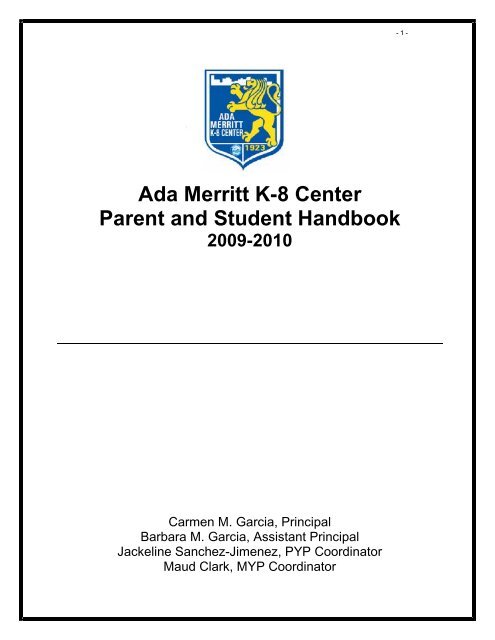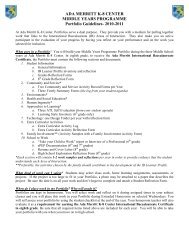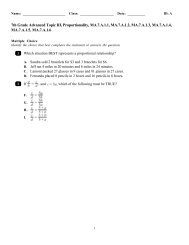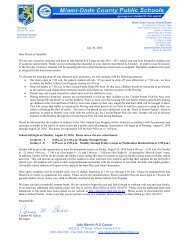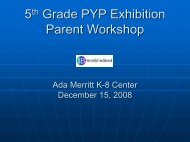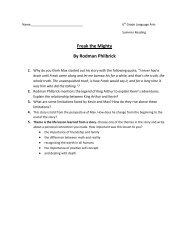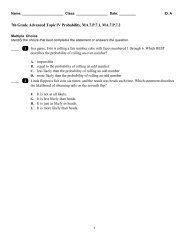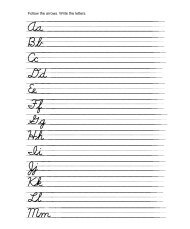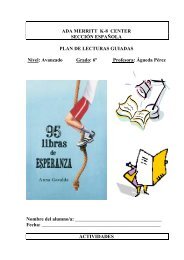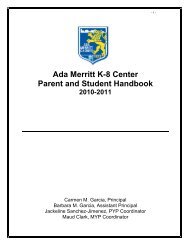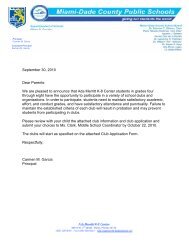Parent and Student Handbook - Ada Merritt K-8 Center - Miami ...
Parent and Student Handbook - Ada Merritt K-8 Center - Miami ...
Parent and Student Handbook - Ada Merritt K-8 Center - Miami ...
- No tags were found...
Create successful ePaper yourself
Turn your PDF publications into a flip-book with our unique Google optimized e-Paper software.
PARTIES<strong>Miami</strong>-Dade County Public Schools are authorized to hold two (2) parties during the schoolyear. They are the winter holiday party <strong>and</strong> the end of the year party. Parties are planned <strong>and</strong>coordinated by the classroom teacher with the help of parent volunteers. <strong>Student</strong>s must earnthe right to attend special activities or receive treats by demonstrating good behavior in school.Birthday parties are not permitted.FUNDRAISERS – BOARD RULE 6GX13-5C-1.07Sale of magazines shall be permitted by students in grades 9, 10, 11 <strong>and</strong> 12 only. Solicitationsshall be permitted in homes only if a student is accompanied by an adult; no soliciting in officesor businesses of any kind. The fundraising activities in each school shall be limited to twoweeks. Promotional activities shall be kept within reasonable bounds <strong>and</strong> competition amongschools, <strong>and</strong> among students in individual schools, shall not be unduly stimulated.BRINGING PETS TO SCHOOL<strong>Student</strong>s are not allowed to bring pets to school.HALLS/HALL PASSES<strong>Student</strong>s should be seated in their classroom when the tardy bell rings. With such a largenumber of students moving in such a limited time, it is incumbent on each person to movequickly <strong>and</strong> in an orderly manner observing normal traffic flow. Please do not push, run or loiterin the halls. Please cooperate with the student patrols, security monitors <strong>and</strong> teachers in theexercise of their duties <strong>and</strong> present a hall pass courteously when asked to do so.At no time is a student to be out of the classroom during class without an official pass.Teachers are not to give verbal permission for a student to exit the classroom.- 9 -
- 10 -SCHOOL CALENDAR HTTP://WWW.DADESCHOOLS.NET/CALENDARS/09-10/09-10_EL-SEC.PDF
- 12 -Important Dates - TentativeTesting CalendarThe calendar will be updated periodically at the district’s website as additional information is obtained about thedistrict, state, national, <strong>and</strong> international tests administered to the students in <strong>Miami</strong>-Dade County Public Schools.MIAMI-DADE COUNTY PUBLIC SCHOOLS2009-2010 TESTING CALENDAR, GRADES K-12Updated: July 16, 2009The calendar will be updated periodically as additional information is obtained about the District, state, national, <strong>and</strong> international testsadministered to the students in <strong>Miami</strong>-Dade County Public Schools.DATEJuly 22 - 23 DESCRIPTION ABBREVIATION PARTICIPANT REASON FOR TESTSAugust 24 –September 11*Alternative Assessment for Grade 3PromotionAAGTP Grade 3,retained onlyStateAugust 24 –October 6Baseline Benchmark AssessmentsReading, Mathematics, <strong>and</strong> ScienceBBA Grades 3-11 State <strong>and</strong>DistrictAugust 31 –September 4Florida Kindergarten Readiness ScreenerEarly Childhood Observation SystemFlorida Assessment for Instruction inReadingFLKRSECHOSFAIRKindergartenStateAugust 31 –October 21District Writing Pre-Test DWT Grades 1-10 State <strong>and</strong>DistrictSeptember/OctoberFlorida Assessments for Instruction inReadingFAIR Grades 1-3,all;Grades 4-12,selectedstudents**State <strong>and</strong>DistrictSeptember 21 –November 13Preliminary ACT Test PLAN Grade 10,optionalNationally OfferedOctober 14Program for International <strong>Student</strong>AssessmentPISA Grade 10,selectedschoolsInternationalOctober 20-26College Board Preliminary SAT/NationalMerit ScholarshipQualifying TestPSAT/NMSQT Grade 10 StateGrade 11,optionalNationally OfferedOctober 23 –November 9*Florida Comprehensive Assessment TestRetake Reading <strong>and</strong> MathematicsFCAT-Retake Grades 11-12,as neededStateNovember –MarchtentativeInterim Assessment TestsReading, Mathematics, <strong>and</strong> ScienceIA Grades 3-11 State <strong>and</strong>DistrictNovember 16 Florida College Entry-level Placement Test FCELPTCPTGrades 11-12,optionalStateDecember 2-8 Grade 3 Mid-Year Promotion GTMYP Grade 3,retained onlyState
- 13 -December 2 –February 4Florida Competency Examination onPersonal FitnessFCEPF Grades 9-11,optionalStateDecember 14-18or January 4-15*Florida Assessments for Instruction inReadingFAIRGrades K-3,all;Grades 4-12,selectedstudents**StateJanuary 12-February 19Interim Assessment TestsReading, Mathematics, <strong>and</strong> ScienceIA Grades 3-11 State <strong>and</strong>DistrictJanuary 25-March 5Florida Alternate Assessment FAA Grades 3-11***StateJanuary 25-May 7National Assessment of EducationalProgressNAEP Grades 4, 8,& 12selectedschoolsFederalFebruary 9-11 Grade 3 Reading <strong>Student</strong> Portfolio GTRSP Grade 3 StateMarch 9-19Florida Comprehensive Assessment TestWritingFCATWritingGrades 4, 8,& 10StateFlorida Comprehensive Assessment TestSunshine State St<strong>and</strong>ardsReading <strong>and</strong> MathematicsFCAT - SSSGrades 3-10Federal <strong>and</strong> StateMarch 16-19ScienceFCAT - ScienceGrades 5, 8,11Reading <strong>and</strong> Mathematics Retake FCAT-Retake Grades 10-12,****as neededApril 6-16Stanford Achievement Test, Tenth EditionReading <strong>and</strong> MathematicsSAT-10 Grades 1 & 2 State <strong>and</strong> DistrictApril 7 -May 25Interim Assessment TestsReading, Mathematics, <strong>and</strong> ScienceIA Grades 3-11, State <strong>and</strong>selected DistrictschoolsApril 12-23Florida Assessments for Instruction inReadingFAIRGrades K-3,all;Grades 4-12,selectedstudents**StateApril 19-May 19District Writing Post-Test DWT Grades 1-10 State <strong>and</strong>DistrictMaytentativeComprehensive English Language LearningAssessmentCELLAGrades K-12,all currentELLs <strong>and</strong>selectedformer ELLsFederal <strong>and</strong> StateMay 3-7Florida College Basic Skills Exit TestReading, Writing, <strong>and</strong> MathematicsFCBSETGrades 11-12,enrolledStateMay 4-15Florida Competency Examination onPersonal FitnessFCEPF Grades 9-11,optionalState
- 14 -May 4-24 Advanced Placement Examinations AP Grades 9-12,enrolled,registeredonlyNationally OfferedMay 24-June 8International Baccalaureate External WrittenExaminationsIB Grades 11-12,enrolled onlyInternationally OfferedTESTS GIVENON AN AS-NEEDED BASISAlternative St<strong>and</strong>ardized ReadingAssessmentASRA Grade 3,selectedstudentsStateDESCRIPTIONAprenda La Prueba de los Logros en Español Segunda EdiciónPlacement decision for Gifted Program Spanish-speaking LEPstudentsABBREVIATIONPARTICIPANTSREASON FOR TESTIOWA Tests of Basic SkillsIOWA Test of Educational DevelopmentPlacement decisions for ESOL ProgramAPRENDAGrades K-12,eligible ELLsStatePlacement decisions for Gifted ProgramOral Language Proficiency ScalePlacement <strong>and</strong>/or exit decisions for ESOL ProgramITBSITEDGrades 3-12,eligiblestudentsFederal <strong>and</strong> StateGrades K-12,selectedstudentsCOLLEGE ENTRANCE EXAMINATIONSNATIONALLY OFFERED FOR INTERESTED, REGISTEREDSTUDENTSOLPS-RGrades K-12,ELLsFederal <strong>and</strong> StateSAT Reasoning <strong>and</strong> SAT Subject TestsOctober 10, 2009ACT TestNovember 7, 2009 September 12, 2009December 5, 2009 October 24, 2009January 23, 2010 December 12, 2009March 13, 2010 (Sat Reasoning Only) February 6, 2010May 1, 2010 April 10, 2010June 5, 2010 June 12, 2010Notes:* All Differentiated Accountability Intervene <strong>and</strong> Correct II D or F schools must complete testing during the first scheduledweek.** The following students in all schools must participate in FAIR as follows:• All students in grades K-3• Grades 4-10: only students in FCAT Levels 1,2, <strong>and</strong> 3• Grades 11-12: only students eligible to take the FCAT Reading Retake*** Only includes ESE students exempted from st<strong>and</strong>ardized testing at these grade levels.**** <strong>Student</strong>s who need to pass one or more sections of the test. Grade 10 retained students only participate in Springadministration.
- 15 -IMPORTANT DATESInterim Report DistributionReport Card DistributionSeptember 24, 2009 November 16, 2009December 3, 2009 February 8, 2010February 25, 2010 April 19, 2010May 6, 2010 June 25, 2010EMERGENCY CONTACT INFORMATION<strong>Student</strong> Data/Emergency Contact Cards are distributed during the first week of school.<strong>Student</strong>s are expected to bring the cards home <strong>and</strong> present them to their parents or guardians.The card must be carefully completed <strong>and</strong> then returned. The information provided on the<strong>Student</strong> Data/Emergency Card will enable school staff to contact the parent/guardianimmediately in the case of an emergency. <strong>Student</strong>s may only be released from school to thepersons listed on the emergency contact card after presenting picture identification. Nopersons, other than school staff, will have access to the information submitted.IMPORTANT: FOR YOUR CHILD’S SAFETY, IF THERE ARE ANY CHANGES IN YOUREMERGENCY CONTACT INFORMATION, YOU MUST SUBMIT IT IN WRITING, OR COMETO THE OFFICE TO MAKE THE CORRECTIONS.CAFETERIAFood CostBreakfastLunchAll <strong>Student</strong>s No Charge <strong>Student</strong>s $2.25Adults $2.00 Reduced Price, <strong>Student</strong>s $0.40Adults $3.00FREE BREAKFASTBreakfast is served daily from 7:30 – 8:15 a.m. Breakfast is FREE TO ALLstudents. The cost for breakfast for adults is $2.00. The National BreakfastProgram was enacted to ensure that school children are being served anutritious breakfast daily. The breakfast at no charge is not dependent on thestudent receiving free/reduced meals at lunch.FREE/REDUCED LUNCH PROGRAMThe National School Lunch <strong>and</strong> School Breakfast Programs as administered by <strong>Miami</strong>-DadeCounty Public Schools provides free <strong>and</strong> reduced priced meals for children unable to pay thefull price. Applications must be filled out every school year; forms are sent to all homes with aletter to parents or guardians the first week of school. Meal benefits begin on the day theapplication is approved <strong>and</strong> continue throughout the school year in which the application isapproved, the summer, <strong>and</strong> approximately the first twenty days of next school year.PAYPAMS www.paypams.com<strong>Miami</strong> Dade County Public School’s Department of Food <strong>and</strong> Nutrition has started a program toallow parents/guardians the convenience to pay on-line via the internet or by telephone for theirchild’s/children meals with a credit card or debit card. The parent/guardians may create a lunchaccount on-line for the child <strong>and</strong> will be above to access the following:a. view the account balanceb. schedule automatic payments
c. receive low-balance e-mail remindersd. view a report of daily spending <strong>and</strong> cafeteria purchases- 16 -CAFETERIA RULESEach class has thirty (30) minutes in the cafeteria. <strong>Student</strong>s are asked to observe the followingcafeteria rules so that order may be maintained:1. Keep in a single line.2. Always be courteous to the cafeteria workers.3. Good table manners, including quiet conversation only.4. Leave the floor <strong>and</strong> table clean for the next group of students.5. <strong>Student</strong>s are not permitted to consume fast food in the school cafeteria.6. Discard the trash appropriately.7. Show respect to aides who are there to assist students.Prepaid Lunches: Lunch may be prepaid on the first day of each week. The food servicemanager will collect monies in the cafeteria. If students are absent, prepaid lunch money will beapplied to the following week's account. The prepaid lunch plan minimizes problems of lostmoney; parents are encouraged to use this plan. Children allergic to milk may substitute orangejuice when buying lunch, provided a doctor's written permission is on file with the cafeteria.SCHOOL-WIDE DISCIPLINE PLANIn PYP <strong>and</strong> MYP, it is believed that education must extend beyond the intellectual to include notonly socially responsible attitudes but also thoughtful <strong>and</strong> appropriate action. An explicitexpectation of the PYP/MYP is that successful inquiry will lead to responsible action, initiated bythe student as a result of the learning process. PYP/MYP schools can <strong>and</strong> should meet thechallenge of offering all learners the opportunity <strong>and</strong> the power to choose to act; to decide ontheir actions; <strong>and</strong> to reflect on these actions in order to make a difference in <strong>and</strong> to the world.Accordingly, students are encouraged to be active learners <strong>and</strong> inquirers. In the event that aclassroom/school policy or rule is violated by a student, the <strong>Miami</strong>-Dade County Public SchoolsCode of <strong>Student</strong> Conduct will be utilized to determine the necessary action to be taken.ADA MERRITT K-8 CENTER SCHOOL RULES1. <strong>Student</strong>s show respect for themselves, for others <strong>and</strong> their possessions, for our school <strong>and</strong>everything in it.2. <strong>Student</strong>s keep h<strong>and</strong>s, feet <strong>and</strong> other objects to themselves.3. <strong>Student</strong>s use acceptable language.4. <strong>Student</strong>s follow directions.5. <strong>Student</strong>s do not prevent the teacher from teaching or other students from learning.6. <strong>Student</strong>s are courteous.7. <strong>Student</strong>s respect <strong>and</strong> follow all school <strong>and</strong> classroom rules.PARENTS AND SCHOOL DISCIPLINEIf your child's teacher reports a discipline problem, talk with your child <strong>and</strong> the teacher, work ona solution together. <strong>Parent</strong>s should support the school rules. Just as at home, classrooms <strong>and</strong>schools must have established rules of conduct. Children should know that their parents expectthem to follow school rules. <strong>Parent</strong>s should become familiar with <strong>and</strong> support the discipline codeor policy of the school.STUDENT RESPONSIBILITIES AND BEHAVIORWhen students show that they are proud of their school, they are showing pride in themselves.It is the students' responsibility:1. to take proper care of books, materials, equipment, desks <strong>and</strong> the school building;2. to protect grass <strong>and</strong> plants by using walkways;3. to help keep the grounds <strong>and</strong> buildings clean;4. to always walk in the building to prevent accidents;
5. to get a pass from the teacher if it is necessary to be in the halls;6. to show respect for all adults <strong>and</strong> children at <strong>Ada</strong> <strong>Merritt</strong> K-8 <strong>Center</strong>;7. to bring all necessary supplies, assignments etc. designated by teachers;8. to bring only appropriate sums of money to school to buy lunch or cover field trip expenses;9. to come prepared to school <strong>and</strong> ready to learn;10. to leave toys, c<strong>and</strong>y, chewing gum, weapons or other unnecessary items at home;11. to leave pets at home; <strong>and</strong>12. to exercise self-discipline <strong>and</strong> self control at all times.<strong>Student</strong> Rights <strong>and</strong> ResponsibilitiesThe rights <strong>and</strong> responsibilities presented in the Code of <strong>Student</strong> Conduct reflect the need forproviding students with greater opportunities to serve themselves <strong>and</strong> society, <strong>and</strong> allowstudents maximum freedom under law, commensurate with the schools' responsibility forstudent health, safety, <strong>and</strong> welfare.<strong>Student</strong>s who violate school rules or are repeated discipline problems may be subject to thefollowing actions:1. A teacher may assign a detention. <strong>Parent</strong>s will be given 24 hours notice.2. If a teacher is unable to gain a student's cooperation, parents will be contacted.3. <strong>Student</strong>s who do not improve after efforts have been made to correct discipline problemswill be sent to the Principal or Assistant Principal(s).4. The Principal or Assistant Principal(s) may decide on the following disciplinary action:a) administrative detentionb) suspension from classc) a physical work assignmentd) indoor suspension from schoole) outdoor suspension from schoolf) recommendation for outside placement5. The <strong>Miami</strong>-Dade County School Board adopted the Code of <strong>Student</strong> Conduct in 1977 <strong>and</strong>revised it in 1995, 1997 <strong>and</strong> 2008. This system of offenses <strong>and</strong> remedies is applicable to allstudents in kindergarten through twelfth grade. It is in effect while attending school, schoolsponsored functions, <strong>and</strong> riding on school buses. The Code, in its entirety, is available ineach classroom, the media center, <strong>and</strong> in the office.PARENT-TEACHER CONFERENCEWhen students are having problems in class, whether academic, emotional or behavioral,parents are encouraged to contact the teacher for a conference.1. A telephone conference may solve the problem. <strong>Parent</strong>s can call the school between thehours of 8:00 a.m. <strong>and</strong> 3:20 p.m. A message will be taken, the teacher will return the callwithin a 24 – 48 hour period.2. <strong>Parent</strong>s who want to meet with the teacher can call or send a note to make an appointmentfor a time convenient to both the parent <strong>and</strong> teacher. Teachers will not be called from classfor an unscheduled conference. Please do not attempt to have a conference at theclassroom door at 8:30 a.m. or during instructional hours.3. When arriving at school for a conference, parents should first come to the office <strong>and</strong> obtaina pass.4. Do not expect to have a conference while a teacher is supervising students. This policyincludes attempting to conduct parent/teacher conferences in the morning while the teacheris picking students up from the cafeteria or while the teacher is allowing students to enterthe class in the primary grades. Please be considerate of the teacher’s time <strong>and</strong> limitedavailability to conduct a conference without an appointment.Conferences are most meaningful when they are planned in advance. The teacher has anopportunity to consider points that may be discussed <strong>and</strong> can have available samples of thestudent’s work for review <strong>and</strong> discussion by the parent(s) <strong>and</strong> teacher(s).- 17 -
Guidelines for Effective <strong>Parent</strong>-Teacher Conferences1. Please contact the teacher <strong>and</strong> schedule a conference time. Remember teachers arecontractually with us from 8:15 a.m. – 3:20 p.m. Although the majority of our dedicatedteachers spend many additional <strong>and</strong> long hours at school, please be mindful of officialteacher hours.2. Familiarize yourself with your child’s teacher’s conference guidelines <strong>and</strong> hours, as wellas the best way to reach the teacher.3. Reasonable efforts will be made to accommodate parents in their primary language or inthe language they feel most comfortable.4. <strong>Parent</strong>s <strong>and</strong> students will be treated with respect <strong>and</strong> courtesy by school personnel.Likewise, parents will treat school personnel courteously <strong>and</strong> respectfully. This includesthe maintenance of appropriate voice tones <strong>and</strong> language while engaging in cooperativeconversations with school personnel. If at anytime, any of the parties involved are notrespectful of each other or feel threatened, <strong>Miami</strong>-Dade County Public Schools (M-DCPS) Police may be contacted.5. Our school building is a welcoming place <strong>and</strong> clearly accessible to parents. However,the rights of students <strong>and</strong> teachers to an orderly instructional <strong>and</strong> safe environment areparamount. <strong>Parent</strong>s may enter a classroom within the school only after properauthorization from office personnel has been secured. Request for classroom visitsrequire a 24-hour notice. Visitors must first register with security at the mainentrance, sign-in <strong>and</strong> produce photo identification, <strong>and</strong> then proceed to register inthe main office.It is extremely important that we have your support in adhering to the procedures outlined above<strong>and</strong> assist the school with this implementation.CODE OF STUDENT CONDUCT<strong>Miami</strong>-Dade County Public Schools (M-DCPS) is committed to providing a safe teaching <strong>and</strong>learning environment for students, staff, <strong>and</strong> members of the community. On March 12, 2008,the School Board approved a newly revised Code of <strong>Student</strong> Conduct (COSC). The revisedCOSC identifies, recognizes, <strong>and</strong> rewards model student behavior within a framework of clearlyestablished <strong>and</strong> enforceable rules <strong>and</strong> policies. It advocates a holistic approach to promoting<strong>and</strong> maintaining a safe learning environment <strong>and</strong> requires active participation from students,parents/guardians, <strong>and</strong> school staff. <strong>Student</strong>s <strong>and</strong> parents/guardians can access the English<strong>and</strong> Haitian/Creole versions of the document on the M-DCPS Website located at:http://eh<strong>and</strong>books.dadeschools.net/policies/90/indes.htm or you may request a copy from yourchild’s school. The Spanish version of this document will be forthcoming.Additionally, M-DCPS is proud to launch SPOTsuccess, an initiative that enhances the COSC. Itsupports civic, moral <strong>and</strong> ethical values, encourages a positive <strong>and</strong> supportive school climate,<strong>and</strong> allows all school personnel to recognize <strong>and</strong> reward students for exemplifying modelstudent behavior. <strong>Parent</strong>s/guardians can check to see if their children are recognized throughthe SPOT success system by creating a <strong>Parent</strong> Account. For instructions, log on to M-DCPSWebsite at http://www2dadeschools.net/parents/parents.htm, click on <strong>Parent</strong> Portal <strong>and</strong> followthe directions on the screen. If you need additional assistance, you may contact your children’sschool(s).A model student who is responsible <strong>and</strong> practices positive behavior daily becomes a successfulstudent <strong>and</strong> a mature adult who is worthy of being emulated. <strong>Student</strong>s need an environmentthat is safe <strong>and</strong> conducive to learning. To help provide <strong>and</strong> maintain that environment, theCode of <strong>Student</strong> Conduct:• describes that positive environment• describes that conduct which is disruptive of such an environment• strives to st<strong>and</strong>ardize those procedures which the school will use in responding toconduct problems• assures the rights of students when disciplinary action is taken• specifies the rights <strong>and</strong> responsibilities of students- 18 -
- 19 -
- 20 -
- 21 -
- 22 -
- 23 -
- 24 -Dress Code- Board Rule 6Gx13- 5C-1.031<strong>Student</strong>s are expected to come to school with proper attention having been given to personalcleanliness, grooming, <strong>and</strong> neatness of dress. <strong>Student</strong>s whose personal attire or groomingdistracts the attention of other students or teachers from their school work shall be required tomake the necessary alterations to such attire or grooming before entering the classroom or besent home by the principal to be properly prepared for school. <strong>Student</strong>s who fail to meet theminimum acceptable st<strong>and</strong>ards of cleanliness <strong>and</strong> neatness as determined by the principal <strong>and</strong>as specified in this rule shall be subject to appropriate disciplinary measures.UNIFORM POLICY<strong>Ada</strong> <strong>Merritt</strong> K-8 <strong>Center</strong> has a m<strong>and</strong>atory uniform policy. <strong>Student</strong>s are required to wear ourschool uniform each day they are in attendance. We want our students to be proud to wear theuniform <strong>and</strong> that it will encourage them to act as young ladies <strong>and</strong> gentlemen, with respect forthemselves <strong>and</strong> those around them. <strong>Student</strong>s are expected to come to school dressed neatly,with attention paid to personal cleanliness <strong>and</strong> grooming. It is recommended that students wearclosed toe athletic shoes which are appropriate for PE activities.• Uniforms are to be worn each day.• No metal cleats on shoes.• No shoes with wheels underneath where children can skate in school, includingHeelys.• No clogs, thongs, s<strong>and</strong>als, or other shoes without back straps.• No hats or b<strong>and</strong>anas (except for religious purposes).• No beepers, cellular phones, I pods, radios, cassette/CD players, or laser pointers areallowed during school hours. (If any of the above are brought to school <strong>and</strong> stolen from astudent’s possession, school administration is not responsible).• No electronic devices, toys or games are permissible.• Ibiley Unforms has been selected as our supplier of uniforms.Store hours are Monday – Saturday 10:00 a.m. to 6:00 p.m.Located at 2069 Southwest 8 Street, <strong>Miami</strong>, FloridaTelephone (305) 625-8050CELL PHONESPossession of a cellular telephone is not a violation of the Code of <strong>Student</strong> Conduct (CSC).However, the possession of a cellular telephone which disrupts the educational process; the useof the cellular telephone during school hours; <strong>and</strong> the possession or use of a cellular telephonewhich disrupts or interferes with the safety-to-life issue for students being transported on a M-DCPS school bus, is a violation of the CSC.Internet Use Policy - see Board Rule 6Gx13- 6A-1. 112Access <strong>and</strong> use of the Internet is a privilege, not a right, <strong>and</strong> its use must support theeducational objectives of the District. <strong>Student</strong>s must always get permission from their teachersprior to using the Internet. In addition, the District prohibits the transmission of materials such ascopyright material, threatening or obscene material or material protected by trade secret, whichviolate local, state, <strong>and</strong> federal law or regulation, as well as the use of the Internet for productadvertisement, commercial activities, political campaigning or solicitation.DRUGS/WEAPONSUnder no circumstances are students to bring drugs, cigarettes, mood modifying substances,etc. to school. Weapons, including (but not limited to) knives, guns (real or toy) or any devicethat could inflict injury or harm to others are not permitted. Violation of these rules will result inan automatic 10 day suspension <strong>and</strong> possible expulsion from school, <strong>and</strong> will be reported to the<strong>Miami</strong>-Dade County Police Department.
SCHOOL CENTER FOR SPECIAL INSTRUCTIONS (SCSI)School administrators may elect to assign students to the School <strong>Center</strong> for Special Instruction(SCSI) as an alternative to suspension from school. The center is designed to provide tutorial<strong>and</strong> guidance services. When misconduct in a class results in an assignment to SCSI, thestudent should be removed from only the class in which the misconduct occurred. Continuedmisconduct can result in removal from all classesSAFETY <strong>and</strong> SECURITYThe Emergency Operations Plan<strong>Student</strong> <strong>and</strong> employee safety is a primary concern of the <strong>Miami</strong>-Dade County Public School (M-DCPS) System. The Emergency Operations Plan (EOP) was created to provide schoolpersonnel with the necessary leadership skills <strong>and</strong> knowledge needed to respond to criticalincidents or other related emergencies that may occur in our schools /community. All schoolshave a site specific plan to address all types of critical incidents. These plans address theindividual needs of the school, <strong>and</strong> provide guidelines for devising methods for communicatingwith the staff, students, parents/guardians, <strong>and</strong> the media during a critical incident or anemergency. Some of the protective action procedures include the evacuation of students/stafffrom the building(s), evacuation of the disabled <strong>and</strong> if necessary the relocation of students/stafffrom the school campus, lockdown procedures <strong>and</strong> holding/dismissing students during school<strong>and</strong> community emergencies. Some important tips for parent/guardians to remember during aCritical Incident are as follows:• Remain calm;• Monitor media outlets for updates <strong>and</strong> official messages from M-DCPS;• Do not flood the school with telephone calls; <strong>and</strong>• If the school is on lockdown, wait until the lockdown is lifted before going to the school.All school administrators, Region <strong>Center</strong> Superintendents/Directors <strong>and</strong> all M-DCPS Policeofficers have been adequately trained in the school EOP <strong>and</strong> are prepared to respondimmediately during a critical incident or emergency to provide safety for all children.Accident ReportsAny student who witnesses an accident or is injured in school should report it immediately thenearest staff member.Campus SecurityRecent events at schools throughout the nation have demonstrated a need for an increase insecurity in order to ensure the safety of our students.• All perimeter gates will be secured during the hours the students are in the school. Allgates will be closed from 8:30 a.m. through 3:00 p.m.• <strong>Parent</strong>s <strong>and</strong> visitors will not be allowed to park in the staff parking lot. The gate at thecircular driveway to the south of the school will open at 7:00 a.m. monitored by schoolsecurity. The north entrance located in the lobby of the main office will open at 7:30 a.m.monitored by office staff <strong>and</strong> school security will monitor the front gate of that entrance.The gate between building one <strong>and</strong> building two will be open to parents <strong>and</strong> monitoredby school security.• All exterior doors will remain locked from the outside.• School personnel will be posted at the Entry/Access Point at all times by the primaryentrance during school hours. The monitor will have a sign-in/sign-out sheet in whichvisitors must disclose their reason for visiting <strong>Ada</strong> <strong>Merritt</strong> K-8 <strong>Center</strong> <strong>and</strong> showidentification. Visitors will then be given a visitor’s sticker to wear. All visitors will berequested to sign-in upon arrival <strong>and</strong> sign-out upon leaving the school premises.• All employees will be asked to wear their identification at all times when in the school.• When employees see visitors in the building without visitor stickers or M-DCPSidentification, they have been asked to please approach the visitor <strong>and</strong> direct him/her tothe main office, <strong>and</strong> when possible escort the unidentified individual to the main office.• Adults may not use the student restrooms. When an adult visitor needs to use therestroom, please use the restrooms located in the main office or the Media <strong>Center</strong>.- 25 -
- 26 -• Please do not open the side entrances of the school when someone is knocking from theoutside as this poses unnecessary safety risk. This bullet was a recommendation fromthe <strong>Parent</strong> Teacher Association (PTA) Safety Committee. Please make every effort touse the main entrances, which have school staff present.• A School Patrol Program will be implemented for fifth through eighth grade students.These student patrols will be available at arrival <strong>and</strong> dismissal to assist with schoolsafety procedures. <strong>Parent</strong>s your support of our school patrols will be appreciated.• If you request any changes in your child’s dismissal, pick-up information, authorizedpersonnel, etc. please ensure you send a note with your child to the teacher clearlyidentifying your request <strong>and</strong> specify the dates. If an emergency occurs, as to where youhave to call the school to request a change in dismissal, it will be required that you faxyour request to (305) 326-0927 <strong>and</strong> attach a copy of your Driver’s License.• Arrival Procedures: <strong>Student</strong>s in Building Two (2) will wait for their teachers sitting downoutside of their classroom until 8:20 a.m. at which time the teachers will open their doorsfor the students to enter the classroom. <strong>Student</strong>s in Building One (1) will wait for theirteachers at their designated table in the cafeteria. Once the teachers pick-up theirstudents from the cafeteria the teachers will escort <strong>and</strong> supervise the students to theappropriate classroom.• Dismissal Procedures for <strong>Student</strong>s: The security monitor(s), assigned teachers, <strong>and</strong>administrator(s) will supervise students in the pick-up areas of the “walkers” area locatedby the northern gate between building one <strong>and</strong> building two; <strong>and</strong> in the “parent pickup”area located by the southern gate at the circular driveway. <strong>Parent</strong>s will wait on theoutside of the building <strong>and</strong> the large pull-down gate will be lifted to dismiss students.Assigned teachers will supervise students who go to the “walkers” area or “parent pickup”.<strong>Student</strong>s will st<strong>and</strong> with their assigned teacher until picked up by parents. Anystudent not picked up by 2:15 p.m. (Kindergarten – first grade) <strong>and</strong> 3:15 p.m. (second –eight grade) will be taken to the After School Care Office, located in Room 104. A fee of$10.00 will be assessed for any student picked up fifteen minutes after dismissal timeaccordingly, 2:15 p.m. or 3:15 p.m.Code Red / Code YellowIn the event of an emergency, the primary responsibility of all school personnel is to provide forthe safety of all students. In the event a school administrator announces a possible threat tostudents <strong>and</strong> staff exists within the community (Code Yellow), or an imminent threat to students<strong>and</strong> staff safety exists within the school (Code Red), the students will comply with all theprocedures outlined in the <strong>Miami</strong>-Dade County Public Schools Critical Incident Response Plan<strong>and</strong> remain on Lock Down until a school administrator makes an “All Clear” announcement.Closing of SchoolThe emergency closing of a school for any cause, such as weather or in which the safety ofindividuals may be endangered, may be at the discretion of the Superintendent of Schools.Fire DrillsTen fire drills will take place according to the <strong>Miami</strong>-Dade County Public School Policy <strong>and</strong>Emergency Procedures. At the sound of the emergency bell, students must stop what they aredoing <strong>and</strong> follow the teacher’s instructions. Promptly clear the building by the prescribed route.Any student who is in the hallway or the restroom at the sound of the emergency bell mustproceed to the nearest exit <strong>and</strong> locate a teacher. <strong>Student</strong>s, teachers, <strong>and</strong> staff must remainoutside the building until permission is given to re-enter.The purpose of a fire drill is to train students to evacuate the school efficiently so that in a realemergency, students will react automatically without wasting time in panic or confusion. Treatfire drills seriously <strong>and</strong> be prepared.
<strong>Student</strong>s will:1. Know their proper exit <strong>and</strong> evacuation route to their line-up position on the school grounds.2. Exit quickly <strong>and</strong> silently.3. At the all-clear signal, return to the classrooms in line <strong>and</strong> silently.4. Obey safety rules during all drills.Tornado DrillsThe purpose of a tornado drill is to train students to respond safely in the event of severeweather. <strong>Student</strong>s are to follow orders for personal safety as directed by the administrator,teachers, <strong>and</strong> emergency response personnel. All tornado drills should be treated seriously <strong>and</strong>students should be prepared.Peanut/Nut Free School<strong>Ada</strong> <strong>Merritt</strong> K-8 <strong>Center</strong> is a peanut/nut free school. Please refrain from sending to school anypeanut-or-nut containing products. In order to avoid accidental contact I am urging all parentsto discourage their children from sharing foods, utensils, <strong>and</strong> containers. In an effort to providea safe learning environment to all our students, we need your cooperation with this request.CONFIDENTIAL INFORMATION: FAMILY EDUCATION RIGHTS AND PRIVACY ACT OF1974 (FERPA)<strong>Parent</strong>s, guardians <strong>and</strong> students are protected by The Family Educational Rights <strong>and</strong> PrivacyAct <strong>and</strong> the Florida Statutes from individuals’ access to information in students’ educationalrecords, <strong>and</strong> are provided the right to challenge the accuracy of these records. These lawsprovide that without the prior consent of the parent, guardian or eligible student, a student'srecords may not be released, except in accordance with the provisions listed in the above-citedlaws. The laws provide certain exceptions to the prior consent requirement to the release ofstudent records, which include, but are not limited to, school officials with a legitimateeducational interest <strong>and</strong> lawfully issued subpoenas <strong>and</strong> court orders.Each school must provide to the parents, guardians or eligible students annual notice in writingof their right to inspect <strong>and</strong> review student records. Once a student reaches 18 years of age oris attending an institution of post-secondary education, the consent is required from the studentonly, unless this student qualifies as a dependent under the law.FIELD TRIPS<strong>Student</strong>s must have permission from their parents, in writing, on the approved form before theywill be permitted to go on any trip sponsored by the school. Other types of notes or telephonecalls will not be accepted, nor will facsimiles be accepted. <strong>Parent</strong>s are allowed to drive vehicles(no vans) on school-sponsored trips, only with the approval of the administration. No underageor other siblings may attend a school field trip. Permission forms <strong>and</strong> fees are to be submittedby the designated deadline. No forms or fees will be accepted after the deadline set by the tripsponsors. In addition, at times vendors who have a “no refund” policy will require schools to paythe full amount of the field trip prior to the event. In this case, students/parents will be notified inadvance of the vendor’s “no refund” policy.FINANCIAL OBLIGATIONSAll financial obligations incurred, i.e. school fees, textbook loss or damage, overdue or lostlibrary books, must be paid in the school treasurer’s office, with Ms. Caballero. It is the parent’sresponsibility to ensure all outst<strong>and</strong>ing fees are paid in full.GRADE REPORTINGAcademic GradesAcademic grades are to reflect the student's academic progress based on thecompetencies/benchmarks for the grade level/course in which the student is enrolled. The grademust not be based upon student's effort <strong>and</strong>/or conduct.- 27 -
- 28 -KINDERGARTEN NUMERICALGRADEVERBAL INTERPRETATIONGRADES VALUE POINT VALUEE 90-100% Outst<strong>and</strong>ing progress 4G 80-89% Above average progress 3S 70-79% Average progress 2M 60-69% Lowest acceptable progress 1U 0-59% Failure 0K-12 NUMERICALGRADEVERBAL INTERPRETATIONGRADES VALUE POINT VALUEA 90-100% Outst<strong>and</strong>ing progress 4B 80-89% Above average progress 3C 70-79% Average progress 2D 60-69% Lowest acceptable progress 1F 0-59% Failure 0I 0 Incomplete 0ConductConduct grades are to be used to communicate to both students <strong>and</strong> their parents/guardiansthe teacher's evaluation of a student's behavior <strong>and</strong> citizenship development. These grades areindependent of academic <strong>and</strong> effort grades.Grade Point AverageWhen calculating the grade for a semester or an annual course, the following grade pointaverages are to be used:A = 3.50 <strong>and</strong> aboveB = 2.50 - 3.49C = 1.50 - 2.49D = 1.00 -1.49Honor Roll QualificationsPrincipal's Honor Superior Honor Lion’s HonorRoll Roll RollAcademicAverage4.0 3.6 3.50 – 3.59AcademicGradesAll As All As <strong>and</strong> Bs All As <strong>and</strong> BsEffort All 1 All 1 <strong>and</strong> 2 All 1 <strong>and</strong> 2ConductAverage4.0 3.6 3.0 or higherConduct Grades All As All As <strong>and</strong> Bs All As <strong>and</strong> BsInterim Progress ReportInterim progress reports must be sent home at any time the student is performingunsatisfactorily in academics, conduct or effort, <strong>and</strong> are disseminated to all students at midgradingperiod.HEALTH SCREENINGSTuberculosis Clinical Screening - Each student shall have proof of a tuberculosis clinicalscreening <strong>and</strong> appropriate follow-up prior to initial enrollment in any grade in a <strong>Miami</strong>-DadeCounty Public School. This screening is to be administered at the time of the <strong>Student</strong> Health
- 29 -Exam <strong>and</strong> within twelve (12) months prior to initial enrollment in any grade in a <strong>Miami</strong>-DadeCounty Public School. If the screening indicates that a follow-up skin test is needed, a studentcan be admitted but only with a health provider's statement that the student is free ofcommunicable tuberculosis <strong>and</strong> can attend school.Scoliosis Screening (6th grade students - applies to K-8 centers) The Florida LegislatureStatute, 381.0056, <strong>and</strong> School Board Rule 6Gx13-5D-1.021 School Health Services Program,m<strong>and</strong>ates scoliosis screenings to be performed annually for students in grade six.Consequently, your school has been scheduled to participate in the Scoliosis ScreeningProgram sponsored by <strong>Miami</strong>-Dade County Public Schools Comprehensive Health Services<strong>and</strong> Easter Seals South Florida. <strong>Parent</strong>s/Guardians will be notified of the school's scoliosisscreenings to be performed <strong>and</strong> results should be reproduced <strong>and</strong> sent to the parents/guardiansof students as soon as possible. This screening will be performed by trained Easter Sealspersonnel on a specified date.Vision <strong>and</strong> Hearing Screening - The Florida Legislature Statute, 381.0056, <strong>and</strong> School BoardRule 6Gx13-5D-1.021 School Health Services Program, m<strong>and</strong>ates vision <strong>and</strong> hearingscreenings to be performed annually for students in kindergarten, first, second, third, <strong>and</strong>sixth grades, <strong>and</strong> new students to the state in fourth <strong>and</strong> fifth grades. The school will senda letter to all parents notifying of the screenings.Immunizations - Requirements for School Entry:1. A complete Florida Certification of Immunization - Blue Card Form DH 680 - according tograde level2. State of Florida School Entry Health Exam - Yellow Form DH 3040 - no older than 12months3. Tuberculosis Clinical Screening, PPD or Chest X-rayILLNESS OR ACCIDENTChildren with minor illnesses, such as headaches or stomach aches, are allowed to rest in theoffice for fifteen minutes <strong>and</strong> then must return to class. If a student is too ill to return to class, orhas been involved in an accident, parents will be notified <strong>and</strong> asked to pick up their child.School personnel are not permitted to administer medication, take temperatures or give anymedical treatment to students. Note: <strong>Student</strong>s who must take medication daily while at schoolmust have the form, available from the school office, completed by their doctor <strong>and</strong> on file in theschool office. Medication must be kept <strong>and</strong> administered in the office. No liquid medicine orcold/flu medicines will be administered.MEDICATIONS<strong>Student</strong>s are not permitted to bring medications of any kind to school. In cases where astudent must take a prescription medication during school hours, parents must make specificarrangements with the school office. Only qualified school office personnel are allowed toadminister prescribed medications <strong>and</strong> only upon receipt of the completed form with writteninstructions from the child’s physician.HEAD LICEUnfortunately, head lice are found from time to time on school children. It is recommended thatparents periodically check their children’s hair for signs of lice, especially if the child complainsthat his/her scalp is itchy or a sibling or close playmate has had lice. Your child’s physician canrecommend special shampoos for killing the lice. While the children are at school, they will bechecked periodically for lice. A student will be sent home if school personnel suspect he/she hashead lice. The student cannot return to school until a note, signed by a physician or health clinicpersonnel, is presented stating that treatment has been undertaken. To prevent an outbreak ofhead lice, parents should be sure that their children’s hair is kept clean. Also, children should bediscouraged from using another child’s comb, brush, hat, hair ribbons, or barrettes.
LIBRARY/MULTIMEDIA CENTERChildren in all grades are permitted to check books out of the library during school hours withthe permission of their teacher. Lost or damaged books must be paid for accordingly. Weencourage our students to be responsible citizens <strong>and</strong> return books on time. Remember nofood or drinks are allowed in the Media <strong>Center</strong>.LOST AND FOUND<strong>Student</strong>s should take any found items to the school office. If you lose something, please checkin the office to claim your possession. Mark all personal items brought to school with thestudent's name for easy identification. Unclaimed articles are donated to needy organizationstwice a year (December <strong>and</strong> June).HOME LEARNINGHome learning is an integral factor in fostering the academic achievement of students. Regularhomelearning provides the opportunity for developmental practice, drill, the application of skillsalready learned the development of independent study skills, enrichment activities <strong>and</strong> selfdiscipline. Homelearning should provide reinforcement <strong>and</strong> extension of class instruction <strong>and</strong>should serve as a basis for further study <strong>and</strong> preparation for future class assignments.Reading is recognized as a universal skill that relates to all subjects. Therefore, when specifichomework assignments are not given, or, when the homework assignment is completed in anexpeditious manner, every student must read, minimally, for the amount of time specified in theBoard Rule. Further, the District’s Comprehensive Reading Plan requires 30 minutes of readinghomework each evening of students in all grade levels.In the event a student is absent, teachers are required to provide students with make-upassignments once the absence has been excused; however, it is the responsibility of thestudent to request the assignments from the teacher(s).<strong>Student</strong>s will be responsible for:1. Completing assigned home learning as directed;2. Returning homelearning assignments to the teacher by the designated time;3. Submitting homelearning assignments which reflect careful attention to detail <strong>and</strong> quality ofwork;4. Obtaining parent’s initials next to the written assignment in the Agenda Book; <strong>and</strong>5. Devoting at least 30 minutes to reading as part of the homelearning assignments.<strong>Parent</strong>’s responsibilities include:1. Providing continued interest <strong>and</strong> concern for the child’s successful performance in schoolthrough encouraging <strong>and</strong> supporting the child in his/her performance of homelearningassignments;2. Indicating an interest in assignments <strong>and</strong> assisting, if possible, when requested by the child,but not to include performing the work for the child;3. Supporting the school with regard to assigned homelearning;4. Requesting assignments for students when short term absences are involved;5. Signing or initialing the daily assignment in the Agenda Book;6. Assisting the school in stressing the importance of reading <strong>and</strong> its benefits; <strong>and</strong>7. Assuring that students read for a period of at least 30 minutes each day in addition to anyother assigned homelearning.It is understood that it is not the parent’s responsibility to give a great deal of assistance to thestudent in completing homelearning assignments. <strong>Parent</strong>s or other family members, however,should make every effort to read to students who cannot read on their own during the assignedhomework period. Due to the nature of the program at <strong>Ada</strong> <strong>Merritt</strong> K-8 <strong>Center</strong>, increasedhome learning time is to be expected.- 30 -
FREQUENCY AND QUANTITY OF HOMELEARNING ASSIGNMENTSEach school, when implementing this homelearning policy, should consider these guidelines asa daily averages:Frequency ofTotal Daily AverageGrade Level Assignments (All Subjects)K-1 Daily (5 days a week) 30 minutes2-3 Daily (5 days a week) 45 minutes4-5 Daily (5 days a week) 60 minutes6-7-8 Daily (5 days a week) 75 minutes9-12 Daily (5 days a week) 120 minutes- 31 -Note: These times do not reflect the additional 30 minutes that are to be devoted to reading.Reading is recognized as a universal skill that relates to all subjects. Therefore, when specifichomelearning assignments are not given, or when the homelearning assignment is completed inexpeditious manner, every student will read, minimally, for the amount of time specified in thisBoard Rule.At the secondary level, students in academic classes should receive a minimum of twohomelearning assignments each week in class. These assignments should be reflected in thestudent’s class grade.HOME LEARNING / MAKE-UP ASSIGNMENTSTeachers are required to provide students with make-up assignments once the absence hasbeen excused; however, it is the responsibility of the student to request the assignments fromthe teacher(s).COMPREHENSIVE READING PLANElementary students are required to read at least five books or their equivalent during eachnine-week grading period, including in-class independent reading <strong>and</strong> at-home reading.<strong>Student</strong>s must also read for 30 minutes at home as part of their daily homework assignment.The length of the books <strong>and</strong> the complexity of the content may be taken into account whensatisfying this requirement.PHYSICAL EDUCATIONPhysical education (PE) is a required, by law, for students in all grades. <strong>Student</strong>s in secondthrough seventh grade are taught by the physical education instructor. <strong>Student</strong>s in kindergarten<strong>and</strong> first grades have physical education with their classroom teacher.All students are expected to participate in PE. In order for your child to be excused fromparticipating in the physical education program due to an injury, illness, or any other medicalreason, the parents must send a note to the PE instructor explaining why the child is to beexcused. For students who must be excused for three successive days or on an extended orregular basis, a physician must complete the prescribed Physical Exemption Card, which isavailable in the school office. The doctor will specify the type of activities in which your childmay participate.The safety of the students during PE activities is of primary concern. The activities planned bythe staff are appropriate for students <strong>and</strong> follow the curriculum guidelines of <strong>Miami</strong>-Dade CountySchools <strong>and</strong> Florida Department of Education.All students are expected to wear clothing <strong>and</strong> shoes that will permit them to run, jump, kick,<strong>and</strong> climb. For your child’s protection, please see that their shoes cover the feet <strong>and</strong> stay onsecurely. If the teacher feels that a student’s clothing or shoes are unsafe for physical educationactivities, he/she will not be allowed to participate.
PROCEDURES FOR ADDRESSING CONCERNS:For issues involving an individual teacher or class, parents address their concerns to thefollowing individuals in the order below:TeacherAssistant PrincipalPrincipalRegion <strong>Center</strong>DistrictTELEPHONEThere are two telephones in the school office that are available for school business only.<strong>Student</strong>s should make any necessary arrangements before leaving home each day so thatphone calls will not be necessary.PARENT PORTALThe parents of all <strong>Miami</strong>-Dade County Public Schools students, including employees, haveaccess to the <strong>Parent</strong> Portal. In order to access the information in the portal, you must firstestablish a parent user account. At this time you can see <strong>and</strong> update personal information, seeyour child’s information – including grades, attendance, <strong>and</strong> bus route information, <strong>and</strong> haveaccess to the <strong>Parent</strong> Resource link, which takes you to sites such as <strong>Parent</strong> Academy, Schoolof Choice, etc.Soon, you will also have access to the electronic grade books for each subject; free <strong>and</strong>reduced lunch applications with balance renewal capability; access to a new Choice applicationthat will allow parents’ to indicate preferential school choice via the portal; <strong>and</strong> access to theSupplemental Educational Services (SES) component of the No Child Left Behind Act.- 32 -http://myportal.dadeschools.net/parent/
PERMANENT RECORDS<strong>Miami</strong>-Dade County Public Schools maintains the records of students in PK-12 <strong>and</strong>adult/vocational students enrolled in high school completion programs or vocational programs of450 hours or more. Permanent records consist of the following student information:a. pupil’s or student’s full legal name;b. authenticated birth date, place of birth, race, <strong>and</strong> sex;c. last known address of pupil or student;d. names of pupil’s or student’s parent(s) or guardian(s)e. name <strong>and</strong> location of last school attended;f. number of days present <strong>and</strong> absent, date enrolled, date withdrawnSPECIAL EDUCATIONThe School Board of <strong>Miami</strong>-Dade County ensures that all students suspected of having adisability are identified, evaluated, <strong>and</strong> provided appropriate, specially designed instruction <strong>and</strong>related services, if it is determined that the student meets the state's eligibility criteria <strong>and</strong> theparent consents to initial placement.Prior to referral for evaluation, the student must have participated in the school's ProgressMonitoring Plan (PMP) program <strong>and</strong> have been referred to the school's intervention team,known as the Child Study Team (CST), the <strong>Student</strong> Support Team (SST) or the <strong>Student</strong>Development Team (SDT).<strong>Student</strong>s with disabilities who are eligible <strong>and</strong> require special education will have an IndividualEducational Plan (IEP). The IEP describes the student's strengths <strong>and</strong> weaknesses <strong>and</strong>documents the services <strong>and</strong> supports the student needs in order to access a Free <strong>and</strong>Appropriate Public Education (FAPE) in the least restrictive environment (LRE).The IEP is a working plan that must be developed by the IEP team at least once every 12months <strong>and</strong> reviewed, when appropriate, to revise <strong>and</strong> address any lack of expected progresstoward annual goals, or to consider any new information that has been provided through reevaluationor by the parent/guardian.<strong>Parent</strong> involvement in the special education process is very important. <strong>Parent</strong>s will be asked toparticipate in the IEP process each year <strong>and</strong> to consider the need for their child's re-evaluationat least once every three years.The Individuals with Disabilities Education Act (IDEA) states that parents of a child with adisability have certain procedural safeguards. The Summary of Procedural Safeguards for<strong>Parent</strong>s of <strong>Student</strong>s with Disabilities documents all the information about the rights ofparents/guardians. This notice of procedural safeguards is made available to the parent, at aminimum, upon initial referral; or the parent's request for evaluation; upon the school district'srefusal to conduct an initial evaluation that the parent has requested; upon each notification ofan IEP meeting; upon consent for re-evaluation; upon the school district's receipt of a requestfor a due process hearing; <strong>and</strong> any other time the parent may request to receive a copy.Other rights that are presented in the procedural safeguard document include, but are notlimited to, the right of prior written notice; informed consent; participation in meetings; records,independent educational evaluation, mediation, state complaint; local education agencycomplaint; due process hearings; resolution meetings; due process; attorney fees; discipline;<strong>and</strong> private school placement.As the parent/guardian of a child with disabilities, you are a very important member of the teamthat plans your child's education. Be informed <strong>and</strong> get involved. If you have any questions,please contact your child's school. Staff from the special education department <strong>and</strong> your child's- 33 -
- 34 -student service provider will help to answer your questions. Additional information may also befound at http://ese.dadeschools.net/.BILINGUAL SCHOOL ORGANIZATION (BISO)Designated as a Bilingual School Organization, <strong>Ada</strong> <strong>Merritt</strong> will offer students the opportunity topursue a dual language education in English/Portuguese or English/Spanish. <strong>Ada</strong> <strong>Merritt</strong> K-8<strong>Center</strong> will implement a two-way bilingual language model.Unique Features:• 60 percent of instruction imparted in English, 40 percent in the other language;• Objective is to foster literacy in both languages enabling students to become bilingual <strong>and</strong>biliterate;• <strong>Student</strong>s study one another’s native language <strong>and</strong> cultural backgrounds;• Language intensive;• Each language has its own space <strong>and</strong> time;• Block scheduling helps facilitate common planning time;• Articulation between teachers is essential.WHAT IS THE PRIMARY YEARS PROGRAM (PYP)?• A comprehensive approach to teaching <strong>and</strong> learning for students, ages 3-12, combining thebest research <strong>and</strong> practice from a range of national systems with a wealth of knowledge <strong>and</strong>experience from international schools;• Provides a framework to meet academic social, physical, emotional <strong>and</strong> cultural needs ofstudents with an international curriculum model that provides guidelines for what studentsshould learn, a teaching methodology, <strong>and</strong> assessment strategies;• Highly rigorous, elementary level program of the International Baccalaureate Organization;• It is committed to structured inquiry;• Defines the characteristics of students who are sensitive to the experience of others,identifying a student profile;• Its curriculum has five essential elements: Knowledge, Concepts, Skills, Attitudes <strong>and</strong>Action, all defined by six transdisciplinary themes;• To promote internationalism, students are required to learn a second language;• It does not have an external moderation of student work by the International BaccalaureateOrganization (IBO), instead, it requires that individual portfolios of student achievement bemaintained; <strong>and</strong>• During the final year of the PYP/Program (Grade 5), students are expected to participate ina PYP Exhibition to demonstrate proficiencies in all areas of the program.WHAT IS THE MIDDLE YEARS PROGRAM (MYP)?The International Baccalaureate Middle Years Programme (MYP) is designed for students aged11 to 16.• The curriculum contains eight subject groups together with a core made up of five Areas OfInteraction (AOI).• <strong>Student</strong>s study subjects from each of the eight subject groups through the five areas ofinteraction: approaches to learning, community <strong>and</strong> service, homo faber, environment, <strong>and</strong>health <strong>and</strong> social education.• Through the Approaches to Learning (ATL) teachers provide students with the tools toenable them to take responsibility for their own learning, thereby developing an awarenessof how they learn best, of thought processes <strong>and</strong> of learning strategies.• Through the Community Service component, students to take an active part in thecommunities in which they live, thereby encouraging responsible citizenship.
- 35 -• In Human Ingenuity, students explore in multiple ways the processes <strong>and</strong> products ofhuman creativity, thus learning to appreciate <strong>and</strong> develop in themselves the human capacityto influence, transform, enjoy <strong>and</strong> improve the quality of life.• The Environment component, aims to develop students’ awareness of their interdependencewith the environment so that they underst<strong>and</strong> <strong>and</strong> accept their responsibilities.• The area of Heath <strong>and</strong> Social Education deals with physical, social <strong>and</strong> emotional health<strong>and</strong> intelligence—key aspects of development leading to complete <strong>and</strong> healthy lives.• The overall philosophy of the program is expressed through three fundamental conceptsthat support <strong>and</strong> strengthen all areas of the curriculum. These concepts are based on:o intercultural awarenesso holistic learningo communicationINTERNATIONAL EDUCATION PROGRAM (IE)<strong>Student</strong>s pursing Portuguese/English proficiency will have the opportunity to enter thePortuguese section of the International Education Program, beginning in Grade 1.Unique Features:• Additional hour of instruction in Portuguese;• <strong>Student</strong>s are recommended by day teacher(s) to participate in the IE program;• Goal is to provide students with an international curriculum which emphasizes study inPortuguese commensurate with that of their peers in Brazil;• <strong>Student</strong>s will explore social science <strong>and</strong> science objectives that are part of Brazil’seducational curriculum;• Highly dem<strong>and</strong>ing academic program.INTERNATIONAL STUDIES PROGRAM (IS)<strong>Student</strong>s pursing Spanish/English proficiency will have the opportunity to enter the Spanishsection of the International Studies Program, beginning in Grade 1.Unique Features:• Additional hour of instruction in Spanish;• <strong>Student</strong>s are recommended by day teacher(s) to participate in the IS program;• Goal is to provide students with an international curriculum which emphasizes study inSpanish commensurate with that of their peers in Spain;• <strong>Student</strong>s will explore social science <strong>and</strong> science objectives that are part of Spain’seducational curriculum;• Highly dem<strong>and</strong>ing academic program; <strong>and</strong>• Established through a cooperative agreement with <strong>Miami</strong>-Dade Public Schools <strong>and</strong> thegovernment of Spain.TRAFFIC-SAFETY PROCEDUREDue to our concern for the safety of all <strong>Ada</strong> <strong>Merritt</strong> K-8 <strong>Center</strong> students, the school staff hasdeveloped a traffic-safety procedure which will be utilized for all students. This procedure is thesame every day, rain or shine. The cooperation of all drivers is needed to ensure we provide asafe environment for our students, so please carefully review the information below.1. No parking in loading zones (posted).2. CIRCULAR DRIVEWAY: All cars must form a line against the curb by Southwest FourthStreet <strong>and</strong> enter through the circular driveway on the south side of the school. Please note,for security reasons, parents will not be permitted to enter through or pick upstudents directly at the Fourth Street gate. <strong>Student</strong>s will only be dismissed to parentswhose cars pull up though the circular driveway <strong>and</strong> into the studentloading/unloading zone.a. The students name card must be displayed on the dash or held for the trafficcommittee to see (cards will be provided the first day of school).b. School staff will call for the students whose car is at the pick up spot.c. The car will immediately move forward <strong>and</strong> enter the driving lane.
- 36 -d. <strong>Student</strong>s may enter cars which have come to a full stop in the passenger loadingzone.e. If a student is not immediately available, the driver must move the car forwardto wait while remaining in the car.f. If traffic backs up, the driver may be asked to circle the block.3. <strong>Student</strong>s will be supervised by school staff <strong>and</strong> teachers.4. On rainy days, students will wait in the corridor until they are called to come to their cars.Please provide your children with a raincoat/poncho that can be kept in student's book bag.5. All students are dismissed at 2:00 p.m., on Wednesdays.6. All students who have not been picked up within 15 minutes of dismissal will be sent to theAfter School Care office, a charge of $10.00 will be assessed.7. <strong>Parent</strong>s may park on the designated parking areas around the school.8. Double parking is against the law. Please do not park in private driveways.9. NOTE: PARKING IN THE FACULTY PARKING LOT IS PROHIBITED.PARENT TEACHER ASSOCIATION (PTA)The greatest portion of your child's day is spent at school. His/her growth <strong>and</strong> development isour joint responsibility. Working <strong>and</strong> planning together for the good of our students <strong>and</strong> theenhancement of our children's education is the function of the PTA. Officers for each schoolyear are elected in the spring of the preceding year.<strong>Parent</strong>al Involvement—A Home-School-District Partnership<strong>Parent</strong>s, we are requesting your support with the implementation of the following school wideguidelines in an effort to maintain a safe <strong>and</strong> effective learning environment conducive to open,collaborative parent-teacher communication. The guidelines listed below will allow our teachersthe time needed for organization, planning, collaboration <strong>and</strong> for appropriate supervision ofstudents at all times:‣ Schedule parent conferences in advance with the teachers.‣ Allow the teachers to pick-up the classes in the morning <strong>and</strong> to dismiss the students inthe afternoon without interruption.‣ <strong>Student</strong>s in Building Two (2) will wait for their teachers outside of their classroom until8:20 a.m. At that time, teachers will open their doors for the students to enter theclassroom.‣ <strong>Student</strong>s in Building One (1) will wait for their teachers at their assigned table in thecafeteria. Once the teachers pick-up their students from the cafeteria, they will escort<strong>and</strong> supervise the students to the appropriate classroom.‣ At 8:30 a.m. all teachers have been directed to lock their doors <strong>and</strong> begin theirinstructional program without interruption.‣ If your child arrives to his classroom after 8:30 a.m., he/she needs to proceed to theoffice <strong>and</strong> secure a late pass. If you accompany your child to class, you will be requiredto secure a visitor’s pass <strong>and</strong> sign-in <strong>and</strong> out.<strong>Parent</strong>al involvement is an essential element in effective education. Effective home-schoolpartnerships contribute to your child’s learning. A copy of this policy is attached for your review.School Board Rule 6Gx13-1B-1.012: PARENTAL INVOLVEMENT -- A HOME-SCHOOL-DISTRICTPARTNERSHIPThe School Board of <strong>Miami</strong>-Dade County recognizes that strong, continuing family <strong>and</strong> community involvement in allaspects of school programs <strong>and</strong> activities provides support for measurable improvement in student achievement. Thisschool board policy creates a collaborative environment in which the parents <strong>and</strong> families of our students are invited<strong>and</strong> encouraged to be involved stakeholders in the school community. It establishes the framework <strong>and</strong>responsibilities for implementation of strategies to increase family <strong>and</strong> community involvement. A copy of this policymust be distributed to all parents (e.g., by providing paper copies, electronic copies, or other appropriate means ofdistribution). In this rule, the term "parent" refers to any adult--mother, father, older sibling, aunt, uncle, gr<strong>and</strong>parent,guardian/foster parent, mentor—who plays a significant role in the care of a student or students enrolled in <strong>Miami</strong>-Dade County Public Schools (M-DCPS). Although parental involvement is the specific focus of this policy, it isrecognized that all those concerned with the education of students must work together cooperatively to meet the
- 37 -needs of students. When the term "school" is used in this Board rule, it is used in the broadest possible sense. Itrefers not only to the customary kindergarten through grade 12 programs, but also to the early childhood, adulteducation, <strong>and</strong> community schools’ programs.I. PARENT RESPONSIBILITIESA. <strong>Parent</strong>s as Their Children’s First Teachers. The importance of parents as teachers shall be recognized byparents <strong>and</strong> supported by the school. Schools will provide parents with the appropriate support <strong>and</strong> assistanceneeded in underst<strong>and</strong>ing <strong>and</strong> meeting the expectations of this role. <strong>Parent</strong>s are expected to:i. Set guidelines <strong>and</strong> clear expectations of good behavior <strong>and</strong> academic performance;ii. Ensure that their children have a quiet place <strong>and</strong> time to read, study, <strong>and</strong> complete homework;iii. Discuss daily work assignments, progress reports, <strong>and</strong> report cards with their children;iv. Ensure that their children attend school on time every day <strong>and</strong> promptly report any absences or tardiness;v. Communicate with the school through written <strong>and</strong> electronic messages, telephone, <strong>and</strong>/or conference meetings;vi. Ensure that their children have the materials needed to complete class work <strong>and</strong> home learning;vii. Take an active part in school activities, such as Back-to-School Night, PTA meetings, participating in workshops,<strong>and</strong> parent/student activities, etc.;viii. Keep their children healthy by ensuring that they get enough sleep, appropriate nutrition, <strong>and</strong> medical care;ix. Bring to the attention of appropriate school personnel any problem or condition that negatively affects theirchildren, or other children in the school community;x. Help their children develop a good self-image by providing care, discipline, support, interest, <strong>and</strong> concern;xi. Provide the school with current <strong>and</strong> accurate home, work, <strong>and</strong> emergency contact information; <strong>and</strong>xii. Foster in their children a positive attitude towards school <strong>and</strong> learning.B. <strong>Parent</strong>s as Advisors, Advocates <strong>and</strong> Participants in Decision Making.• Advisors. <strong>Parent</strong>s are encouraged to participate in <strong>and</strong> influence decisions, raise issues or concerns, appealdecisions, <strong>and</strong> resolve problems.• Advocates. <strong>Parent</strong>s are encouraged to become advocates for children on issues that affect children. They areurged to join <strong>and</strong> take a leadership role in a PTA, PTSA or other parent organization.• Educational Excellence School Advisory Councils.<strong>Parent</strong>s must be elected to serve as active members of Educational Excellence School Advisory Councils (EESAC)<strong>and</strong> in other important decision-making bodies, where required by state <strong>and</strong> federal statutes. This will include theinvolvement of parents in the development of the Local Educational Agency Title I Plan required under section 1112of The No Child Left Behind Act of 2001 as well as their involvement in the process of school review <strong>and</strong>improvement required under section 1116 of the Act.• Title I School-<strong>Parent</strong> Compacts. In each school implementing the Title I Program, parents shall jointly with theschool develop the annual Title I School-<strong>Parent</strong> Compact that outlines how parents, the entire school staff, <strong>and</strong>students will share the responsibility for improved student academic achievement. This compact will also identify howthe school <strong>and</strong> parents will build <strong>and</strong> develop a partnership to help children achieve the State’s high st<strong>and</strong>ards.• Title I School’s <strong>Parent</strong>al Involvement Policy. In each school implementing the Title I Program, parents shalljointly with the school add language to the existing M-DCPS School Board Rule 6Gx13- 1B-1.012, <strong>Parent</strong>alInvolvement – A Home-School-District Partnership, to describe how the school will carry out the parental involvementrequirements in Section 1118 of The No Child Left Behind Act of 2001.This amended document will serve as the Title I School’s <strong>Parent</strong>al Involvement Policy. Additionally, parents in theTitle I Program shall be involved in the annual evaluation <strong>and</strong> redesign of the content <strong>and</strong> effectiveness of thisdocument, in efforts towards improving the academic quality of the school.II. SCHOOL LEVEL STRATEGIES AND RESPONSIBLITIESA. <strong>Parent</strong> Outreach Liaisons. Each school principal will identify one or more individuals who will serve as a liaisonto all parents in the school community. Responsibilities include: assessing the needs of parents; communicating thisinformation to the school's principal <strong>and</strong> the school’s advisory group(s); <strong>and</strong> informing parents of school <strong>and</strong> Districtservices, offerings, <strong>and</strong> programs in their primary language. This individual may be a Community InvolvementSpecialist, another staff member, or a Certified Volunteer.B. Space for <strong>Parent</strong>s. School principals will provide a <strong>Parent</strong> Resource <strong>Center</strong> as a place for parents to meet, post,<strong>and</strong> review current bulletins, <strong>and</strong> exchange information.C. Access to Schools. Reasonable efforts will be made to make the school building a welcoming place, clearlyaccessible to parents. <strong>Parent</strong>s are expected to recognize, however, that their right to access does not transcend therights of students <strong>and</strong> teachers to an orderly educational environment.D. Sensitivity to Exceptionalities. Reasonable efforts will be made to assist parents in underst<strong>and</strong>ing the needs<strong>and</strong> rights of their children. Reasonable efforts should be made to assist school personnel, students <strong>and</strong> parents inunderst<strong>and</strong>ing the needs <strong>and</strong> rights of children with different exceptionalities.E. Accommodations for <strong>Parent</strong>s. School personnel should utilize flexible <strong>and</strong> creative methods to accommodatethe schedules of parents, <strong>and</strong>, with the assistance of businesses, agencies <strong>and</strong> organizations, to encourageparticipation by addressing the need for child care, transportation <strong>and</strong> other resources. Every reasonableaccommodation should be made for School Board employees who are parents to participate in the education of theirchildren.F. Communication. Communication between parents <strong>and</strong> the school shall be encouraged at all grade levels,including regular parent/teacher communication, <strong>and</strong> providing parents with meaningful scope of student work.Reasonable efforts will be made to communicate with parents in their primary language. The mode of communicationshould also be adjusted when necessary to promote comprehension, acceptance, <strong>and</strong> trust. Additionally, schools
- 38 -implementing the Title I Program will distribute annually to parents, at the onset of the school year, the Title I ProgramNotification Letter, in a format, <strong>and</strong> to the extent practicable, in a language such parents underst<strong>and</strong>.G. <strong>Parent</strong> Orientation. Schools will conduct orientation meetings that provide information about school procedures<strong>and</strong> programs as well as opportunities for active participation. Additionally, schools in the Title I Program shouldconduct an initial Orientation Meeting at the onset of the school year (which may be held during the Open Housemeeting/orientation) to inform parents of their school’s participation in the Title I Program, to explain the parentalrequirements in Section 1118 of The No Child Left Behind Act of 2001, <strong>and</strong> to explain the Rights of the <strong>Parent</strong>s to beinvolved.H. Educational Excellence School Advisory Councils.Schools must ensure that parents are included as active members of Educational Excellence School AdvisoryCouncils <strong>and</strong> other important decision-making bodies as required by federal <strong>and</strong> state statute. To ensure that parentsare knowledgeable about this involvement, all parents must receive information regarding the role of EESAC, meetingschedules, <strong>and</strong> parent elections. With the support of the EESAC, principals will develop <strong>and</strong> support strategies thatfacilitate opportunities for all parents to be involved in at least one support activity during the course of the year.I. Title I School-<strong>Parent</strong> Compacts. Each school implementing the Title I Program shall ensure that parents in theProgram are involved in jointly developing, <strong>and</strong> that they receive, the annual Title I School-<strong>Parent</strong> Compact asrequired in Section 1118(d) of the No Child Left Behind Act of 2001 that outlines how parents, the entire school staff,<strong>and</strong> students will share the responsibility for improved student academic achievement <strong>and</strong> the means by which theschool <strong>and</strong> parents will build <strong>and</strong> develop a partnership to help children achieve the State’s high st<strong>and</strong>ards.J. Title I School’s <strong>Parent</strong>al Involvement Policy. In each school implementing the Title I Program, parents shalljointly with the school create a policy which incorporates the existing M-DCPS School Board Rule 6Gx13- 1B-1.012,<strong>Parent</strong>al Involvement – A Home-School-District Partnership, <strong>and</strong> which describes how the school will carry out theparental involvement requirements in Section 1118 of TheNo Child Left Behind Act of 2001. This amended document will serve as the Title I School’s <strong>Parent</strong>al InvolvementPolicy. Additionally, parents in the Title I Program shall be involved in the annual evaluation <strong>and</strong> redesign of thecontent <strong>and</strong> effectiveness of this document, in efforts towards improving the academic quality of the school.K. Learning Opportunities for <strong>Parent</strong>s. With the assistance of The <strong>Parent</strong> Academy <strong>and</strong> other appropriate Districtoffices, schools should identify <strong>and</strong> implement community-centered, parent friendly programs <strong>and</strong> affiliations forparents to learn. The learning opportunities should target appropriate student age levels, including the needs ofchildren from birth to age six as well as the developmental <strong>and</strong> cognitive needs <strong>and</strong> expectations of students.Additional learning opportunities should be provided for young adults, including those who are already parents, tolearn how to be effective parents.L. Volunteers <strong>and</strong> Tutors. Principals should utilize the special knowledge, abilities, talents, <strong>and</strong> cultural experiencesof parents to enhance school activities <strong>and</strong> experiences. In order to maintain a strong volunteer program, principalswill identify staff who will actively recruit, train, appropriately place, support, <strong>and</strong> monitor parents in instructional <strong>and</strong>extra-curricular programs. Volunteer procedures <strong>and</strong> forms will be made available throughout the year.M. Resources for <strong>Parent</strong>s. In order to assist parents, resources should be made available for check-out at theschool site, such as: audio/visual, print, computer, <strong>and</strong> web-based programs; "how-to" programs broadcast oneducational television <strong>and</strong> radio; pamphlets <strong>and</strong> books developed especially to aid the parent-as-teacher; copies ofcourse schedules <strong>and</strong> homework assignments; lists of grade level <strong>and</strong> course objectives; testing guidelines; <strong>and</strong>schedules. Additionally, the Title I H<strong>and</strong>book should be made available for check-out to parents of students in theTitle I Program.N. Advocacy. Schools, Regional <strong>Center</strong>s <strong>and</strong> the District will support parents to become advisors <strong>and</strong> advocates fortheir children. They will provide underst<strong>and</strong>able, accessible, <strong>and</strong> well-publicized opportunities as well as informationabout student <strong>and</strong> parent responsibilities <strong>and</strong> rights in order that parents may advocate effectively. Regional <strong>Parent</strong>Liaisons will provide information <strong>and</strong> assistance to parents of children with exceptionalities.III. DISTRICT LEVEL STRATEGIES AND RESPONSIBILITIESA. District <strong>Parent</strong> Resource Office. The Office of <strong>Parent</strong>al Involvement functions as a liaison with parents to providea District level point of communication for referral <strong>and</strong> direction on parental involvement issues. It is the primaryresponsibility of this office to promote parental involvement, facilitate implementation of this policy, <strong>and</strong> maintaincontact with various groups <strong>and</strong> individuals representing parents. The office will assist other programs in theimplementation of 6Gx13- 1B-1.012 parent involvement strategies. These programs will include The <strong>Parent</strong>Academy, Early Childhood Programs, Bilingual <strong>Parent</strong> Outreach Program, State <strong>and</strong> District-run Voluntary Prekindergarten(VPK) programs, <strong>and</strong> Title I Administration.B. <strong>Parent</strong> Involvement Training. The Office of <strong>Parent</strong>al Involvement, in cooperation with The <strong>Parent</strong> Academy, TitleI Administration, <strong>and</strong> other appropriate District offices, where applicable, will develop <strong>and</strong> provide training programs togive parents the information, tools, <strong>and</strong> resources on how to be successful advisors, advocates, <strong>and</strong> partners in thedecision-making process. The training programs must include assistance to parents to underst<strong>and</strong> such topics as theSunshine State St<strong>and</strong>ards, the FCAT <strong>and</strong> other assessments, the requirements of The No Child Left Behind Act,ways to monitor a child’s progress, <strong>and</strong> ways to work with educators to improve student achievement. The Districtshould also facilitate parent-to-parent training programs.C. Support for <strong>Parent</strong>al Involvement Strategies. Through the Office of <strong>Parent</strong>al Involvement, The <strong>Parent</strong>Academy, Title I Administration, <strong>and</strong> other appropriate District offices, the District shall provide the coordination,technical assistance, <strong>and</strong> other support necessary to assist schools in planning <strong>and</strong> implementing effective parentalinvolvement activities to improve student academic achievement <strong>and</strong> school performance as well as to build theschools’ <strong>and</strong> parents’ capacity for strong parental involvement as defined in the No Child Left Behind Act, section1118. Additionally, schools implementing the Title I Program will receive support <strong>and</strong> assistance through the following
- 39 -Title I components: parental District Advisory Council’s general <strong>and</strong> executive board meetings, the <strong>Parent</strong> OutreachProgram, Community Involvement Specialists, <strong>Parent</strong> Advisory Councils, <strong>and</strong> District <strong>and</strong> school-site <strong>Parent</strong>Resource <strong>Center</strong>s.D. Support for Communication. Appropriate District offices will develop <strong>and</strong> implement effective communicationmethods to ensure that all families, regardless of income, ethnic background, or language, receive <strong>and</strong> share schoolto-home<strong>and</strong> home-to-school communications. Additionally, Title I Administration will provide to schools implementingthe Title I Program the sample Title I Program Notification Letter, to be distributed to their parents annually, at theonset of the school year.E. Staff Training. Training procedures should include the importance of parental involvement. Training programs willbe identified by the Office of <strong>Parent</strong>al Involvement, Title I Administration, The <strong>Parent</strong> Academy, <strong>and</strong> other appropriateDistrict offices, to assist personnel in acquiring techniques that promote effective communication with parents <strong>and</strong> thecultivation of parental involvement.F. Resource Guide. A resource guide will be developed for school staff members, parents, <strong>and</strong> the community, toinclude best practices <strong>and</strong> a directory of contact information for programs, <strong>and</strong> persons with expertise in the area ofparental involvement. Additionally, the Title I Administration H<strong>and</strong>book is an appropriate resource to support schoolsimplementing the Title I Program, in this area.G. Title I School-<strong>Parent</strong> Compacts. Title I Administration will ensure that all schools participating in the Title IProgram jointly with parents develop the annual Title I School-<strong>Parent</strong> Compact that outlines how parents, the entireschool staff, <strong>and</strong> students will share the responsibility for improved student academic achievement. Title IAdministration will assist with ensuring that schools distribute the Compacts to all parents in the Title I Program.H. Title I District Wide <strong>Parent</strong>al Involvement Policy. School Board Rule 6Gx13- 1B-1.012, <strong>Parent</strong>al Involvement –A Home-School-District Partnership, serves as the District Wide <strong>Parent</strong>al Involvement Policy required by The NoChild Left Behind Act of 2001 for schools implementing the Title I Program. This Policy has been developed jointlywith, <strong>and</strong> agreed upon by, parents of children participating in the Title I Program. Title I Administration will assist inensuring that this Policy is distributed to all parents in the Title I Program.I. Evaluation. The Office of <strong>Parent</strong>al Involvement <strong>and</strong> the Family <strong>and</strong> Community Involvement Advisory Committee,on which the majority of the members are parents, will annually assess the implementation of the <strong>Parent</strong> InvolvementPolicy, using outcome-based data, including, but not limited to, the School Climate Survey <strong>and</strong> the <strong>Parent</strong>Benchmarks Survey, <strong>and</strong> will make written recommendations for improvement.This assessment will identify barriers to greater participation by parents in parental involvement activities, withparticular attention to parents who are economically disadvantaged, have limited English proficiency, have limitedliteracy, or are of any racial or ethnic minority background. The findings of the evaluation will be used to designstrategies for more effective parental involvement <strong>and</strong> to revise existing parental involvement policies.J. Business Involvement. The active cooperation of the community's businesses, agencies, organizations, <strong>and</strong>postsecondary institutions will be sought to partner with the District to provide on-site opportunities for parents tolearn more about the school district, the educational needs of students, <strong>and</strong> about parenting in general. These entitiesmay be asked to partner with the district to provide educational experiences at the school sites. Members of thecommunity will be encouraged to assist students by participating in programs such as Listeners, Mentors, <strong>and</strong> RoleModels. Businesses will be encouraged to provide flexible time or release time for employees to visit their children’sschool. The District will establish a program to designate businesses as “school friendly” when they meet establishedDistrict criteria.Specific Authority: 1001.41(1)(2); 1001.42(23); 1001.43(10) F.S.Law Implemented, Interpreted, or Made Specific: 1001.32(2)(4);1001.43(5);1002.20(1)(2)(18)(b)(20)(b)(c) F.S.; The No Child Left Behind Act of 2001, P.L. 107-110History: THE SCHOOL BOARD OF MIAMI-DADE COUNTY, FLORIDA New: 6-13-07STUDENT ACCIDENT INSURANCEThe <strong>Student</strong> Protection Plan is designed to cover students or injuries while traveling to <strong>and</strong> fromschool or when involved in accidents while engaged in supervised activities on the schoolpremises. Participation in this program is voluntary. At the beginning of the school year, anenvelope <strong>and</strong> application for this coverage will be sent home with your child. Prior toparticipating in the Before- After-School Care Program the student accident insurance must bepurchased.TEXTBOOKSTextbooks are furnished by the State of Florida <strong>and</strong> distributed by classroom teachers. Allchildren have textbooks which have been individually selected to meet their needs. <strong>Student</strong>s willbe charged for lost books which have been issued to them <strong>and</strong> for damage to books throughnegligence. Please stress with your child the importance of respect for school materials <strong>and</strong>property.
VISITORSDue to legal regulations, students are not permitted to have guests attend school with them atany time. <strong>Parent</strong>s/guardians are always welcome <strong>and</strong> tours may be arranged to view theschool. Classroom visits require a 24-hour notice. Visitors must first register with security at themain entrance, sign-in <strong>and</strong> produce photo identification, <strong>and</strong> then proceed to register in the mainoffice. Anyone who fails to follow these procedures will be considered a trespasser <strong>and</strong> issubject to arrest.For safety <strong>and</strong> protection of all students, visitors must always obtain clearance from the officebefore proceeding to a classroom. No child will be permitted to leave the building with a visitor(including parents) unless a release has been signed in the office.Please do not just drop in to see your child's teacher. When this becomes a regular practice, theinstructional program is continually disrupted. It becomes difficult for a teacher to remainorganized <strong>and</strong> keep control of a classroom of students even when his/her attention is removedfor a few minutes.ElevatorsThe school elevator is to be used by individuals who are h<strong>and</strong>icapped <strong>and</strong> cannot use the stairs.THE PARENT ACADEMYThe <strong>Parent</strong> Academy is a free, year-round, parent engagement <strong>and</strong> skill building program of<strong>Miami</strong>-Dade County Public Schools (M-DCPS). The goals are to educate parents about theimportance of their role; strengthen the family unit; unite families <strong>and</strong> schools; <strong>and</strong> informparents of their rights, responsibilities <strong>and</strong> the educational opportunities available to theirchildren <strong>and</strong> to them personally.In addition, The <strong>Parent</strong> Academy provides classes <strong>and</strong> workshops for parents/guardians;organizes Family Learning Events; coordinates the availability of M-DCPS <strong>and</strong> communityresources for parents/guardians <strong>and</strong> students; <strong>and</strong> provides professional staff development forschool personnel on how to create parent-friendly schools.Within this framework, The <strong>Parent</strong> Academy offers classes <strong>and</strong> workshops developed aroundthe nine subject area str<strong>and</strong>s listed below:. Help Your Child Learn (Example: PASSport to Success - 8 module series). <strong>Parent</strong>ing Skills (Example: Positive Discipline). Early Childhood (Example: Developing Early Literacy Skills). Arts & Culture (Example: Enrich Your Child through Arts <strong>and</strong> Culture in <strong>Miami</strong>). Languages (Example: American Sign Language for Families). Computer Technology (Example: <strong>Parent</strong> Portal). Health <strong>and</strong> Wellness (Example: Preventing Substance Abuse). Financial Skills (Example: Financing Your Child's College Education). Personal Growth (Example: GED Preparation - offered through Adult Education)The <strong>Parent</strong> Academy "campus" is spread throughout every comer of this community, <strong>and</strong> offersfree classes <strong>and</strong> workshops at over 201 local sites such as public schools. libraries. parks.colleges. private businesses. <strong>and</strong> neighborhood centers. Monthly calendars are posted in theCourse Directory section on The <strong>Parent</strong> Academy's Web site athttp://theparentacademy.dadeschools.net. The <strong>Parent</strong> Academy staff members are available toprovide parents/guardians, students <strong>and</strong> school sites with guidance <strong>and</strong> assistance inscheduling workshops. Staff can be reached at (305) 995-2680.- 40 -
Volunteer ProgramThe School Volunteer Program is responsible for electronic registration, background checks <strong>and</strong>trainings of volunteers. There are two different levels of volunteerism.- 41 -Level 1 - complete a database background check• Day chaperones for field trips• Classroom assistants• Math <strong>and</strong>/or reading tutors.Level 2 - complete a fingerprint background check• Certified Volunteers• Mentors• Listeners/Oyentes• Athletic/Physical Education assistants• Overnight chaperones.Any individual interested in volunteering in <strong>Miami</strong>-Dade County Public Schools must:• Complete Registration Form #1764, date <strong>and</strong> sign, <strong>and</strong> submit to a school or worklocation.• Show a current valid government-issued identification with picture.• Show a social security card (check name <strong>and</strong> number).• Complete a background check.• Upon clearance, attend an orientation at the school.
- 42 -PrincipalCarmen M. GarciaAssistant PrincipalBarbara M. Garcia<strong>Miami</strong>-Dade County School BoardDr. Solomon C. Stinson, ChairDr. Marta Pérez, Vice ChairAugustin J. BarreraRenier Diaz de la PortillaDr. Lawrence S. FeldmanPerla Tabares HantmanDr. Wilbert “Tee” HollowayDr. Martin KarpAna Rivas LoganSuperintendent of SchoolsAlberto M. CarvalhoAugust 24, 2009Dear <strong>Parent</strong>,Welcome back to the 2009-2010 school year. Please be informed that one of the students in our school hasa severe life-threatening peanut/nut allergy. As a result, this school is a peanut/nut free school. Pleaserefrain from sending to school any peanut-or-nut containing products. In order to avoid accidental contact Iam urging all parents to discourage their children from sharing foods, utensils, <strong>and</strong> containers.In an effort to provide a safe learning environment to all our students, we need your cooperation with thisrequest. If further information is needed, please do not hesitate to contact me at (305) 326-0791.Respectfully,Carmen M. GarciaPrincipalcc:Mr. Freddie WoodsonDr. Essie S. Pace<strong>Ada</strong> <strong>Merritt</strong> K-8 <strong>Center</strong>660 S.W. 3 RD Street ⋅ <strong>Miami</strong>, Florida 33130305 326-0791 ⋅ Fax 305 326-0749 ⋅ http://adamerritt.dadeschools.net
- 43 -PrincipalCarmen M. GarciaAssistant PrincipalBarbara M. Garcia<strong>Miami</strong>-Dade County School BoardDr. Solomon C. Stinson, ChairDr. Marta Pérez, Vice ChairAugustin J. BarreraRenier Diaz de la PortillaDr. Lawrence S. FeldmanPerla Tabares HantmanDr. Wilbert “Tee” HollowayDr. Martin KarpAna Rivas LoganSuperintendent of SchoolsAlberto M. Carvalho24 de agosto del 2009Estimados padres,Bienvenidos al año escolar 2009-2010. Por favor, tengan en cuenta que uno de los estudiantes denuestro colegio padece una alergia severa, que puede llevarle a la muerte, a los manís y nueces.Esta escuela está considerada como una escuela libre de manis y nueces. Por favor no envíen a laescuela ningún producto que contenga estos alimentos. Para evitar contactos accidentales les urjoa que hablen con sus hijos y les persuadan para que no compartan comida, cubiertos y envasescon los demás.En un esfuerzo por proporcionar un ambiente de aprendizaje seguro para todos nuestros alumnos,necesitamos su cooperación en este asunto. Si necesitan más información, por favor no duden encontactar conmigo al (305) 326-0791.Respetuosamente,Carmen M. GarcíaDirectoracc:Mr. Freddie WoodsonDr. Essie S. Pace<strong>Ada</strong> <strong>Merritt</strong> K-8 <strong>Center</strong>660 S.W. 3 RD Street ⋅ <strong>Miami</strong>, Florida 33130305 326-0791 ⋅ Fax 305 326-0749 ⋅ http://adamerritt.dadeschools.net
- 44 -PrincipalCarmen M. GarciaAssistant PrincipalBarbara M. Garcia<strong>Miami</strong>, dia 24 de Agosto de 2009.<strong>Miami</strong>-Dade County School BoardDr. Solomon C. Stinson, ChairDr. Marta Pérez, Vice ChairAugustin J. BarreraRenier Diaz de la PortillaDr. Lawrence S. FeldmanPerla Tabares HantmanDr. Wilbert “Tee” HollowayDr. Martin KarpAna Rivas LoganSuperintendent of SchoolsAlberto M. CarvalhoPrezados Pais,Bem-vindos ao ano letivo de 2009-2010. Gostaríamos de informar-lhes que em nossa escola há umaluno com um grave problema de alergia a amendoim que pode ser fatal. Por esta razão, em nossaescola é proibido trazer qualquer produto com amendoin, nozes ou seus derivados. Para evitarmosum acidente de contato, estamos pedindo a todos os pais que instruam seus filhos a nãocompartilharem seus alimentos ou utensílios.Precisamos da cooperação de todos para mantermos um ambiente seguro para nossos alunos. Seprecisarem de alguma informação favor contactar-me pelo telefone (305) 326-0791.Respeitosamente,Carmen M. GarcíaDirectoracc:Mr. Freddie WoodsonDr. Essie S. Pace<strong>Ada</strong> <strong>Merritt</strong> K-8 <strong>Center</strong>660 S.W. 3 RD Street ⋅ <strong>Miami</strong>, Florida 33130305 326-0791 ⋅ Fax 305 326-0749 ⋅ http://adamerritt.dadeschools.net
- 45 -PrincipalCarmen M. GarciaAssistant PrincipalBarbara M. GarciaAugust 24, 2009<strong>Miami</strong>-Dade County School BoardDr. Solomon C. Stinson, ChairDr. Marta Pérez, Vice ChairAugustin J. BarreraRenier Diaz de la PortillaDr. Lawrence S. FeldmanPerla Tabares HantmanDr. Wilbert “Tee” HollowayDr. Martin KarpAna Rivas LoganSuperintendent of SchoolsAlberto M. CarvalhoDear <strong>Parent</strong>,The <strong>Parent</strong> <strong>and</strong> <strong>Student</strong> H<strong>and</strong>book is being sent to you to keep you <strong>and</strong> your family informed of the school’soperations <strong>and</strong> policies. Hopefully, it will answer any questions you may have. However, if you still havequestions or concerns, feel free to call the school at (305) 326-0791.Please retain the h<strong>and</strong>book as a reference for the entire school year. In order to assure the school that youhave received the h<strong>and</strong>book, please sign the form below <strong>and</strong> return it to the homeroom teacher. Yourcooperation is appreciated.Respectfully,Carmen M. GarciaPrincipalPlease complete <strong>and</strong> return this form to school.I acknowledge receipt of the <strong>Parent</strong> <strong>and</strong> <strong>Student</strong> H<strong>and</strong>book.Child’s Name (Please Print) Teacher’s Name Grade Level<strong>Parent</strong>’s Signature___________________________Date<strong>Ada</strong> <strong>Merritt</strong> K-8 <strong>Center</strong>660 S.W. 3 RD Street ⋅ <strong>Miami</strong>, Florida 33130305 326-0791 ⋅ Fax 305 326-0749 ⋅ http://adamerritt.dadeschools.net
- 46 -PrincipalCarmen M. GarciaAssistant PrincipalBarbara M. Garcia<strong>Miami</strong>-Dade County School BoardDr. Solomon C. Stinson, ChairDr. Marta Pérez, Vice ChairAugustin J. BarreraRenier Diaz de la PortillaDr. Lawrence S. FeldmanPerla Tabares HantmanDr. Wilbert “Tee” HollowayDr. Martin KarpAna Rivas LoganSuperintendent of SchoolsAlberto M. CarvalhoAugust 24, 2009Dear <strong>Parent</strong>/Guardian:Please be advised that there is NO supervision of students after dismissal time. This situationposes a safety problem.Effective immediately, you are informed of the following: <strong>Student</strong>s left in school after dismissal<strong>and</strong> not participating in any supervised after school programs/activities, will be escorted to theAfter-School Care Office, Room 104. <strong>Parent</strong>s will be assessed a fee of $10.00 per child for theday.GradeDismissal Time – Supervision TimeKindergarten – First GradeSecond Grade – Eighth Grade2:00 p.m. – 2:20 p.m. (Monday – Friday)3:00 p.m. – 3:20 p.m. (Monday, Tuesday, Thursday &Friday)2:00 p.m. – 2:20 p.m. (Wednesday)Your support is paramount in maintaining a safe learning environment for your child.Should you have any questions, please feel free to contact us at (305) 326-0791.Respectfully,Carmen M. GarciaPrincipal<strong>Ada</strong> <strong>Merritt</strong> K-8 <strong>Center</strong>660 S.W. 3 rd Street ⋅ <strong>Miami</strong>, Florida 33130(305) 326-0791 ⋅ Fax (305) 326-0927 ⋅ http://adamerritt.dadeschools.net
- 47 -


